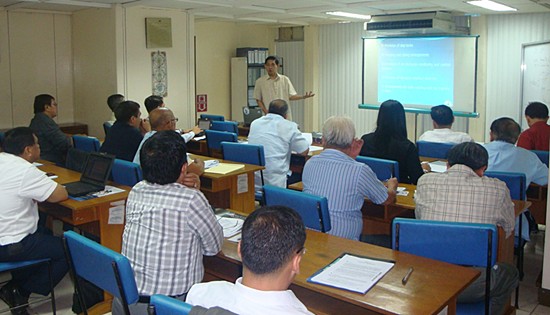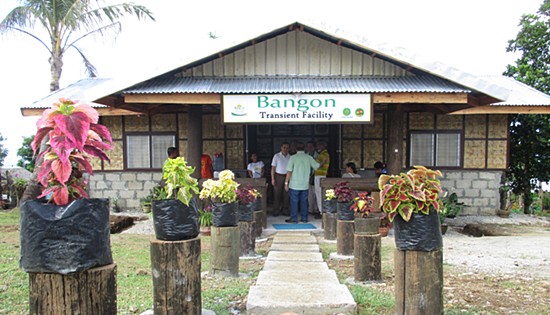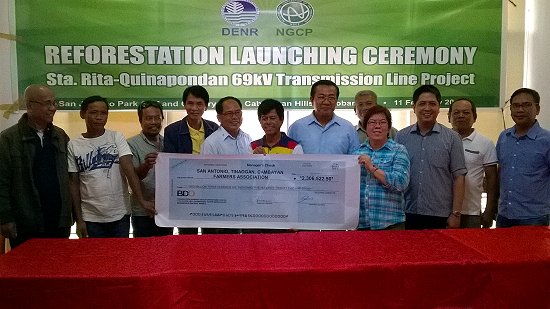NMP continues to
offer Deck, Engine, SMS & other upgrading courses

Press Release
March 19, 2015
TACLOBAN CITY –
National Maritime Polytechnic (NMP), a government maritime training
and research agency located at Brgy. Cabalawan, this City, continues
to offer Deck, Engine, Safety, Medical and Security (SMS) upgrading
and Professional Development Courses to aspirants to the seafaring
industry, active seafarers, maritime trainers and assessors, and other
allied personnel in the maritime industry.
The Deck, Engine, Safety,
Medical and Security (SMS) upgrading and Professional Development
Courses regularly offered by NMP include Marine Electrical System (MES),
Radar Navigation, Radar Plotting and Use of ARPA (RNRPUARPA), Marine
Refrigeration and Air Conditioning (MRAC), Maritime Law for Ship
Officers (MAR LAW), STD/HIV/AIDS Prevention in the Maritime Sector (SHAPIMS),
Prevention of Alcohol and Drug Abuse in the Maritime Sector (PADAMS),
and Gender Sensitivity Training for Seafarers (GSTS).
Marine Electrical System (MES)
is a five-day course wherein the trainees are expected to be able to
apply the concepts and principles of electrical systems normally
installed in ships; carry out all necessary activities in the
generation of electrical power; perform the tests required in the
operation and maintenance of electrical machines and control systems;
and appreciate the importance of marine electrical system in shipboard
operations.
Radar Navigation, Radar
Plotting and Use of ARPA (RNRPUARPA) is a nine-day upgrading course
which will enable the trainee to recognize the appropriate time when
radar should be in use, select a suitable mode and range setting for
the circumstances, set the controls for optimal performance, and be
conscious of the limitations of the equipment in detecting targets and
in terms of accuracy, to name a few. Course contents include Basic
theory and operation of marine radar system, setting up and operation
of radar in accordance with manufacturer's instructions, performing
manual radar plotting, use of radar to ensure safe navigation, use of
radar to avoid collisions or close encounters, and description and
operation of an ARPA system.
Marine Refrigeration and Air
Conditioning (MRAC) is another five-day course that provides trainee
participants with the applied knowledge and practical skills in
blueprint reading, operation, maintenance and troubleshooting
techniques of marine refrigeration and air-conditioning systems. This
also helps trainees acquire required knowledge, understanding and
proficiency in working with marine refrigeration and air-conditioning
on board ship.
Maritime Law for Ship
Officers (MAR LAW) is a five-day professional development course which
is intended for masters and ships’ officers focusing on the salient
features of maritime law with regard to their authorities, rights,
duties and responsibilities in the commercial operation of seagoing
merchant ships. Based on IMO Model Course 7.01, the course is aimed at
enhancing and broadening the seafarer-trainees’ legal knowledge and
understanding.
STD/HIV/AIDS Prevention in
the Maritime Sector (SHAPIMS) is a one-day training course which deals
on the nature of STD/HIV infection/AIDS and the methods of prevention
and control, sexual behavior changes and modification, communicating
its prevention in the workplace and among seafarers, partner
notification and preventive measures. Aside from active seamen and
aspirants, seafarers’ wives, and personnel of shipping and manning
agencies are likewise encouraged to take this.
Prevention of Alcohol and
Drug Abuse in the Maritime Sector (PADAMS) is another one-day course
which covers topics on the nature and extent of alcohol and drug
problem in the maritime sector, preventive measures and policies to
address such problems, effects of alcoholic beverages in the
performance onboard ships, pertinent laws and regulations as
prescribed in Chapter VIII, Section B-VIII/2, Part 5 of the 1978 STCW
Convention, as amended.
Gender Sensitivity Training
for Seafarers (GSTS) is a four-hour course covering topics on gender
roles ascribed by the society, gender equality and equity,
rights-based approach to sexual and reproductive health, Anti-Violence
against Women and their Children Act (RA 9262), and The New Anti-Rape
Law (RA 8353). This course is offered free to paying trainees enrolled
in other courses.
To those interested in
availing the said courses, you may directly visit NMP or inquire
through the Registrar at the following contact numbers:
09771269675/09298417490. The training schedule of the said courses is
now available at NMP. You may also send your inquiries and/or
reservations to info@nmp.gov.ph or nmp.info@yahoo.com
4 million join
“poorest of the working poor club” as poverty continue to overtake
even minimum wage workers’ income since 2014
By TUCP-Nagkaisa
March 16, 2015
QUEZON CITY – There are now four million more of more than 20 million
poorest of the working poor nationwide who cannot even afford the
daily P293 cost of food and basic commodities needed by a Filipino
family of five to survive, said workers’ lobby group the Trade Union
Congress of the Philippines-Nagkaisa (TUCP-Nagkaisa).
With this, the labor group urged government to take immediate
solutions following a survey showing poverty continues to surpass poor
workers’ take home pay and has now overtaken minimum wage earners’ in
Metro Manila and in all other regions in the Philippines since last
year, recent poll released by the Philippine Statistics Authority (PSA).
Results of 2014 survey released March 6, poverty incidence among
Filipino families worsened to 20% in the first half of 2014 from 18.8%
in 2013 while the subsistence incidence rose from 7.5% in 2013 to 7.6%
this year.
The result also showed incomes of poor families were short by 27% of
the average poverty threshold of P8,778/month or P293/day for a family
of five in the first semester of 2014. This means, on the average, an
additional P2,370 was needed by a poor worker and his family with five
members in order to move out of poverty.
“With its 400 days left in office, President Noynoy Aquino must
re-focus and re-devote his remaining time, energy, and political
capital if he still he wants to make a direct impact to Filipino
workers and their families. Rather than being kept busy by sexy
political issues, he has to address one of the core issue of growing
and escalating poverty incidence,” said TUCP spokesperson Alan
Tanjusay.
In the National Capital Region (NCR) alone, the highest minimum wage
in all 17 regions, government said the real value of the current P466
minimum daily wage is P356.64 or P7,846.08 a month or P932 short of
the poverty threshold. The same survey showed 10.5% of the working
population whose income cannot afford even the food threshold alone.
The poorest is in Yolanda-hit Eastern Visayas region with 2.2 million
families who cannot afford the minimum amount of P293/daily amount.
The current real value of the P280 daily minimum wage is P184/day.
The National Economic Development Authority (NEDA) cited the rapid
rise in food prices and the lingering effects of typhoon Yolanda as
key reasons poverty worsened. Rice prices alone increased to 11.9% in
the first semester of 2014 to 1.7% in the same period of 2013.
International
tribunal to hear rights violations in the Philippines launched
Press Release
March 12, 2015
QUEZON CITY – An
international tribunal to try cases of human rights violations under
the presidency of Benigno S. Aquino III has been launched today at the
University of the Philippines, Diliman Quezon City.
Dubbed as the International
People’s Tribunal (IPT), the initiative will bring into focus the
ongoing human rights violations in the Philippines and hold Pres.
Aquino and the government of the United States as represented by Pres.
Barrack Obama to account before the international community.
“Beneath the
liberal-democratic façade of the Aquino regime, brutal repression of
people’s civil and political rights abound, with hundreds of cases of
extra-judicial killings and forced disappearances and massive
displacement of families,” according to Cristina Palabay of Karapatan,
one of the complainants to the IPT.
The IPT will also probe into
the role of the increasing US military presence and intervention in
the Philippines in worsening the state of human rights in the country.
“The Mamasapano operation
raises questions over the extent of the US military’s involvement in
Philippine domestic security. Meanwhile, the Philippine government’s
failure to assert jurisdiction over US marine officer Joseph Scott
Pemberton for the murder of Jennifer Laude highlights how unequal ties
between the US and the Philippines invite impunity,” according to
Vanessa Lucas of the US-based National Lawyers Guild, one of the
convenors of the IPT.
The Chairperson of the
International Coalition for Human Rights in the Philippines and
another IPT Convenor, Reverend Canon Barry Naylor, explained that the
IPT, although judicially non-binding, is symbolic and significant.
“People’s tribunals have had
success in directing international attention to grave abuses of human
rights in various countries including the Philippines during the
Marcos and Arroyo regimes. The IPT draws inspiration and builds on the
momentum of previous peoples’ tribunals to advance human rights and
hold governments to account,” he said.
In 2008, a US Senate
investigation on human rights violations in the Philippines under
former President Gloria Macapagal-Arroyo led to restrictions on a
portion of the annual US military aid package to the Philippine
government tied to the implementation of strong human rights
recommendations by US advocates.
The IPT is set to convene on
July 16-18, 2015 in Washington DC. Former US Congresswoman and peace
advocate Cynthia McKinney will be among the distinguished panel of
jurors who will hear live testimonies of witnesses from the
Philippines.
Conveners of the tribunal
include the International Coalition for Human Rights in the
Philippines (ICHRP), the National Lawyers Guild (NLG), the
International Association of Democratic Lawyers (IADL), and IBON
International.
For more information on the
International Peoples Tribunal, visit internationalpeoplestribunal.org.
Construction of
Gandara-Matuguinao road project completed

By MARIANETTE Y. GOMEZ
March 12, 2015
CALBAYOG CITY – The
longtime dream of the people in the Municipality of Matuguinao to be
connected to the growth centers of Samar and likewise to the
neighboring Province of Leyte is coming true with the appropriation of
the funds for the completion of the whole stretch of
Gandara-Matuguinao Road every year.
For CY 2014, the concreting
of 2,757 linear meter of road covering Brgys. Pizarro, Hiparayan and
Peñaplata all in Gandara, Samar has been funded P50 million. The said
road sections in three barangays can now offer convenient travel.
Though the total road
stretch to the Municipality of Matuguinao has not been fully concreted
yet, another project for 2015 with a total length of 2,384 linear
meters amounting to another P50 million is underway starting from Brgy,
Peñaplata to Brgy. Tawiran.
To render the road sections
fully operational, road sections of four barangays have yet to be
concreted which will continue to be funded by the District Office till
2017.
With this condition of the
road leaving only few kilometers of all-weather road, economic
activities in the area start to flourish.
|

Rev.
Fr. Robert Reyes joins environmental groups BAN Toxics,
Greenpeace and Ecowaste Coalition in a protest run, dubbed as
BasuRUN, along the streets of Makati Business District to demand
the immediate re-exportation of the 50 Canadian container vans
filled with hazardous wastes that continues to rot in the Port
of Manila. (AC Dimatatac/BAN Toxics) |
Running priest
leads BasuRUN against Canadian toxic waste
Press Release
March 10, 2015
MANILA – As the
illegal Canadian toxic wastes continue to rot in the Port of Manila
for over 600 days now, running priest Father Robert Reyes joined the
call for Canada to immediately re-export the illegal shipment, as he
and environmental advocates led by BAN Toxics, Ecowaste Coalition and
Greenpeace staged a “BasuRUN” in Makati City.
Reyes, a known environmental
and human rights activist, joined the groups on Tuesday as they ran
along the main streets of Makati City business district leading to
RCBC Plaza, where the Canadian Embassy is located, to decry the
illegal and ‘overstaying’ toxic shipment and to urge Canada to take
responsibility for their wastes.
“These toxic wastes are the
worst form of expressing friendship between our two countries,” Reyes
said. “Prime Minister Stephen Harper’s government is an embarrassment
to the civic-minded and environmentally conscious Canadians. We know
this is not the real Canada. We urge Prime Minister Harper to take
immediate action. Take back your illegal waste shipment now!”
On February 2014, the Bureau
of Customs (BOC) seized 50 container vans containing various waste
materials and hazardous wastes imported from Canada, with the
consignee Chronic Plastics, Inc. declaring the shipment as ‘assorted
scrap plastic materials for recycling’.
Canada’s stance, however,
pins the blame on the private consignee and maintains that it does not
have any legal capacity to compel the Canada-based exporter Chronic
Incorporated, to re-export their noxious shipment.
“It’s been more than a year
and yet we are battling the same problem. The Canadian government
won’t listen but they should, and we will not stop until they take
back the illegal shipment that they dumped in our country,” said Atty.
Richard Gutierrez, Executive Director of BAN Toxics.
Gutierrez said that the
shipment – containing a mixture of household and toxic wastes – should
be re-exported in accordance with the Basel Convention, an
international treaty that regulates toxic waste shipments. The Basel
Convention prohibits illegal toxic waste trade and requires the
exporting country, in this case Canada, to take back the illegally
seized shipment and to pay the costs for the return. Both Canada and
the Philippines are party to the Basel Convention.
The importation violates a
number of local laws such as the DENR Administrative Order 28 (Interim
Guidelines for the Importation of Recyclable Materials Containing
Hazardous Substances) and Republic Act 9003 or the Ecological Solid
Waste Management Act of 2000.
According to the groups’
calculations, the government is spending at least P144,000 a day for
the loss of income for storage space and the additional expenses for
demurrage, which, to date, costs around P87 million.
In an effort to gain public
attention on the issue, the coalition filed an online petition on
change.org that drew more than 25,000 signers, more than half of which
are Canadians. The group is encouraging more people to sign the online
petition to appeal and urge the Canadian embassy in the Philippines to
facilitate the pick-up and return of the garbage back to Canadian
soil.
|

The
newly constructed Bangon Transient Facility at the 19th Infantry
(Commando) Battalion camp in Brgy. Aguiting, Kananga, Leyte
which serves as housing to Bangon farmer-partners, former
rebels, dependents and visitors. |
Bangon holds
assembly at Army camp in Leyte
By 19th Infantry Battalion,
8ID PA
March 8, 2015
KANANGA, Leyte – An
Army camp in Leyte was again abuzz Thursday, March 5, 2015.
Some 120 trustees and
farmer-partners of the Bangon Mini-Farms Alpha Sector Association
Incorporated (BMFASAI) all over the province of Leyte convened for a
seminar dubbed as “7-Habits of Highly Effective People” at 19th
Infantry Battalion camp in Brgy. Aguiting, Kananga, Leyte.
The two-day live-in seminar
was conducted to empower and inculcate key habits that will ensure
productivity of Bangon farmer partners.
Coinciding the aforesaid
seminar, Army-inspired peoples organizations composed of former rebels
(FRs) from Ormoc City and from Jaro, Kananga, San Isidro and Calubian
towns put up booths. Each displayed organic vegetable products from
their respective mini-farms.
Other products were also
displayed by military dependents, turning the entire camp on holiday
mode amidst nearly 200 spectators.
Lt. Col. Nedy Espulgar,
commanding officer of 19IB said Bangon Executive Chairman and Landbank
of the Philippines (LBP) Director Domingo Diaz have earlier
recommended 19IB camp as venue of aforesaid assembly.
Landbank of the Philippines
(LBP) has poured resources resulting to the completion of a transient
facility inside 19IB camp which now serves as billeting to Bangon
farmer-partners, dependents and other visitors.
Having hosted similar
events, Lt. Col. Espulgar was confident that the assembly would run
more comfortable and educational for the participants as its camp is
already equipped with advanced and protocol-based Livestock and
Organic Garden Demonstration Farms.
“At first, we were merely
partakers when the program jumpstarted on January last year. But now,
we in 19IB under supervision of Col. Dinoh Dolina, the commander of
the 802nd Infantry Brigade, proudly consider ourselves as one of the
prime movers of Bangon. Our interest grew when we saw it to be in line
with the AFP’s Internal Peace and Security Plan “Bayanihan”. We also
believe that we can help more depressed communities through
implementing sustainable, integrated, organic and natural mini-farm
program”, Lt. Col. Espulgar narrated.
The program is set to expand
and be introduced to farmers in other parts of Leyte and even Southern
Leyte province.
According to trustee Thelma
Pondolanan, Bangon is eyeing the areas of operations of 78th Infantry
Battalion particularly in the town of Mahaplag, Leyte.
Bangon sustainable,
integrated, organic and natural mini-farm program, as LBP’s
post-Yolanda initiative was founded on January 2014 at Blanco Farm,
So. Marag-ing, Lemon, Capoocan, Leyte.
It was later renamed Bangon
Mini-Farms Alpha Sector Association Incorporated (BMASAI) and received
its Certificate of Incorporation (COI) from the Securities and
Exchange Commission on June 18, 2014. The COI contains Company Reg.
Nr. CN201411778 and Company TIN 008-801-182 signed by Dir. Ferdinand
B. Sales of SEC’s Company Registration and Monitoring Department.
|

Mr.
Randy Galang (3rd from right) and Ms. Julia Echavez (4th from
right) of NGCP’s Planning and Engineering Group turn-over a
check to the San Antonio, Tinaogan, Cambayan Farmers Association
for the implementation of the reforestation project in Basey,
Samar. A similar check was handed over to the Samar Sur Upland
Farmers Association and DENR-PENRO. |
NGCP launches
90-hectare reforestation project in Samar island
Press Release
March 5, 2015
TACLOBAN CITY – Power grid
operator and transmission service provider NGCP is tapping Basey,
Samar and Giporlos, Eastern Samar as prime sites for its reforestation
projects. NGCP is undertaking the projects in coordination with the
Department of Environment and Natural Resources (DENR)’s Community
Environment and Natural Resources Office (CENRO) and farmer
associations.
At the February 11 project
launching, NGCP formalized its commitment to plant more than 149,000
fruit-bearing and indigenous tree seedlings as part of its Sta. Rita-Quinapondan
transmission line project. The 69-kiloVolt (kV) lines will span 95.53
kilometers and pass through the municipalities of Sta. Rita, Basey,
and Marabut in Western Samar and Lawaan, Balangiga, Giporlos, and
Quinapondan in Eastern Samar.
“NGCP takes into
consideration the environmental impact of all its projects. For every
naturally growing tree cut, 100 seedlings will be planted. And for
every planted tree, 50 seedlings will replace them. We also included
the replacements for trees felled by Typhoon Yolanda. With the
guidance of CENRO and the commitment of the Farmers’ Associations in
Basey and Giporlos, NGCP is confident that we will complete this
project over the course of three years,” NGCP’s Engineering Project
Management Department Head Mr. Randy A. Galang said.
The 80-hectare Basey
reforestation site will be jointly developed by NGCP and the San
Antonio, Tinaogan, Cambayan Farmers Association while the 10-hectare
Giporlos site will be maintained by NGCP and Samar Sur Upland Farmers
Association. DENR-CENRO will be tasked to handle surveying, mapping,
training, and supervision of the entire project.
The Sta. Rita-Quinapondan
transmission line project aims to accommodate growth in power supply
and demand, ensure voltage quality, improve reliability of power
transmission services to SAMELCO and ESAMELCO franchise areas, and
extend power delivery services to unelectrified areas in the region.
NGCP is a privately owned
corporation in charge of operating, maintaining, and developing the
country’s power grid. It transmits high-voltage electricity through
“power superhighways” that include the interconnected system of
transmission lines, towers, substations, and related assets. The
consortium holds the 25-year concession contract to operate the
country's power transmission network and is comprised of Monte Oro
Grid Resources Corp., led by Henry Sy, Jr., Calaca High Power
Corporation, led by Robert Coyiuto, Jr., and the State Grid
Corporation of China (SGCC) as technical partner.
As a socially responsible
company, it is committed to create a sustainable environment and
protect the natural resources particularly in areas hosting its
transmission facilities.